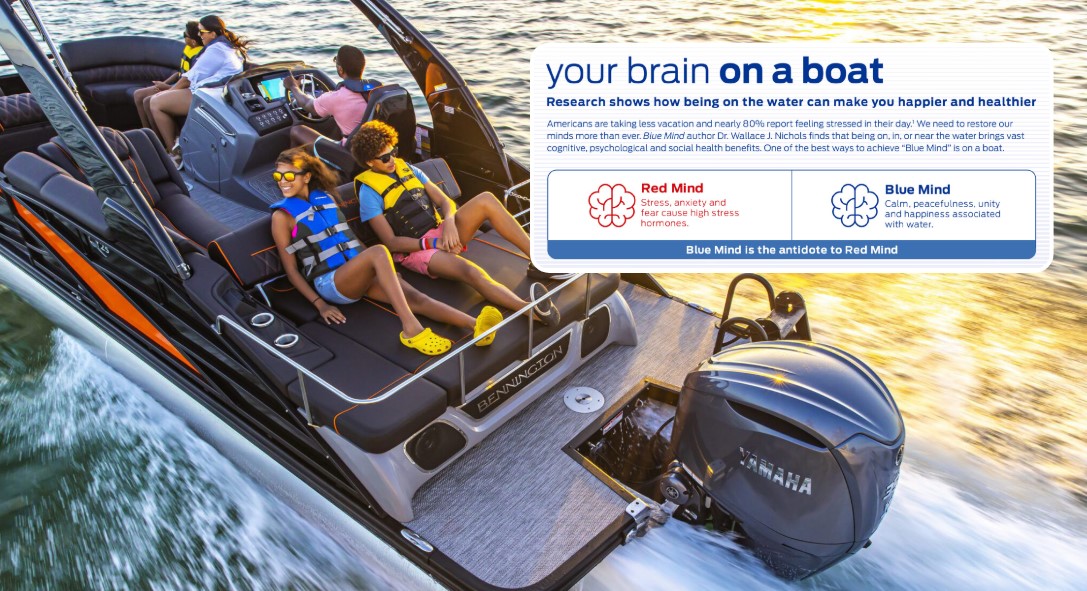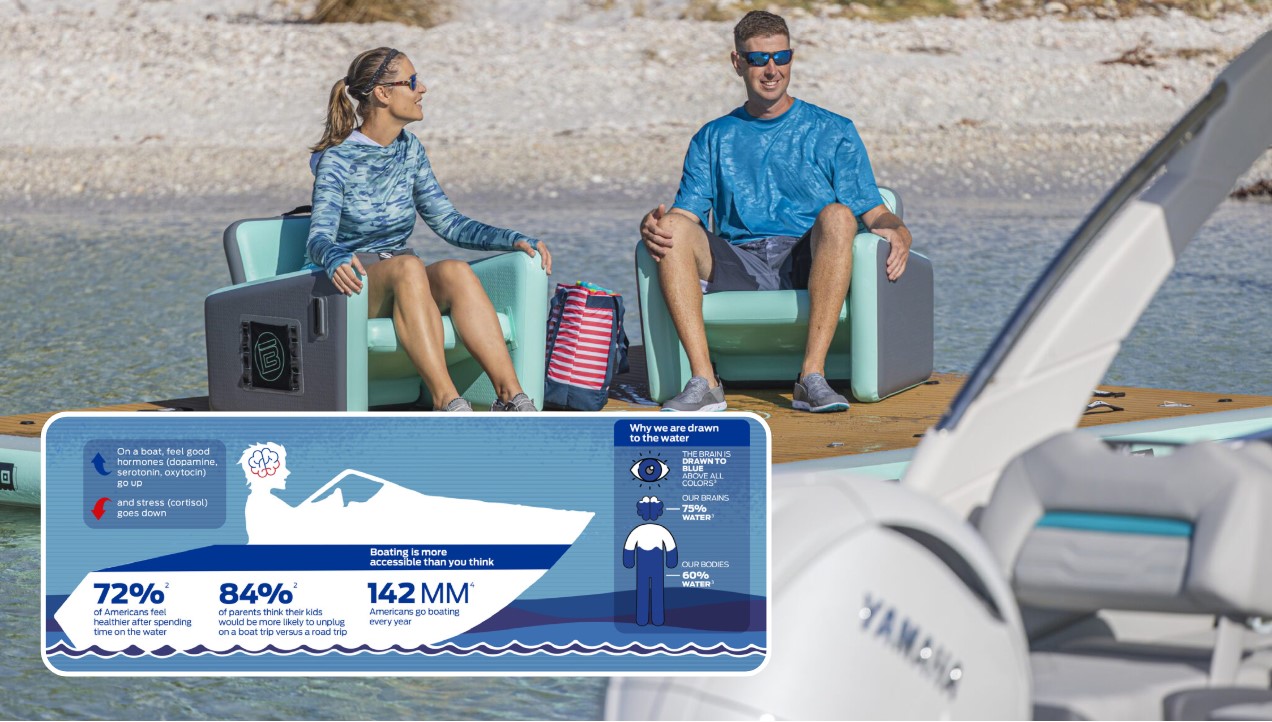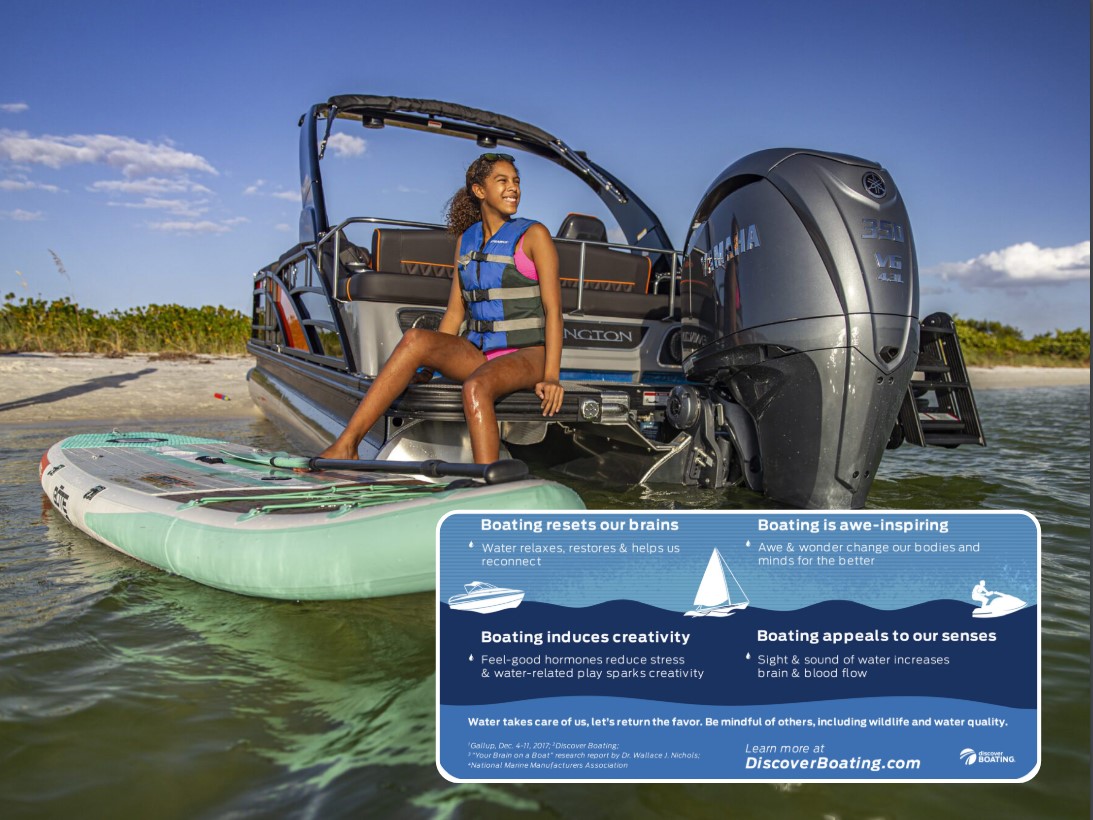Have you ever felt better—more calm, more focused, and recharged—after spending a day on the water? If you’ve spent much time on a boat, I bet the answer is yes.
What you might not know, however, is that time on boats and on the water is scientifically proven to benefit your physical and mental health. In 2017 marine biologist Dr. Wallace J. Nichols wrote the best-selling book, Blue Mind: The Surprising Science That Shows How Being Near, In, On, or Under Water Can Make You Happier, Healthier, More Connected, and Better at What You Do. Through a combination of neuroscience, interviews, and storytelling, Wallace reveals the incredible scope of benefits that people derive from being on or around water.
.jpg)
You have likely experienced these feelings, even if you’ve never given them a second thought. What follows is a breakdown of boating’s effect on mental health. At the risk of spoiling the suspense, boating is not only fun, but it’s good for your body, mind, and spirit.
Disconnecting: The Importance of Unplugging
We live in a world that is constantly competing for our attention. App notifications, e-mails, text messages, and calendar appointments bombard us, keeping many of us in a continual state of engagement. Our increasingly planned and scheduled world creates overstimulation. Being overstimulated for long periods can create stress and anxiety. This constant state of arousal taxes your nervous system. As a result, many among us build up feelings of burnout and exhaustion. These feelings leave our minds and bodies tired, drained of energy. There’s a cure. It’s simple, direct, and profound. Stepping off the dock and onto a boat is a great way to unplug. It stops the dinging, the pop-ups, and the reminders. It allows you to think. It lets your mind and body rest, reset, and recalibrate.
Time on the water and in nature has been recognized for its ability to help people feel better for hundreds of years. Doctors in Victorian England would prescribe “sea air” as a treatment for all manner of physical and mental ailments. Henry David Thoreau moved to a cabin in the woods to experience these benefits. To derive the same benefits, all you need to do is to go boating.
Nichols explains that advancements in technology allow neuroscientists to see the part of the brain, the amygdala, that creates and processes emotions. Scientists have discovered that just by seeing and being around water, we may experience happiness, empathy, and compassion. These feelings have a physiological effect that can be measured in terms of reduced heart rate, slower breathing, and reduced temperature of our skin.

Surrounding Yourself with People You Enjoy
In an increasingly busy world, it can seem difficult to carve out time for doing things that you like with people you like to be around. After all, you’re busy, they are busy. Who has the time?
Boats are a perfect place to recharge while enjoying the company of family and friends. This can mean meeting at the dock for a day with fishing buddies or taking a family day on the water. Making time and enjoying it with people you care about is good for you.
The act of stepping onto a boat is both physical and symbolic. In pulling away from the dock, you leave your cares behind. You’ve made the commitment to spending time doing what you enjoy in the presence of who you like.
The more you do it, the better you will feel-- recharged, refreshed, and energized. Your relationships with the people you choose to spend time with will benefit, so too will your mental state. In fact, Dr. Nichols’ book explains that when you spend time with someone on the water, you create a “neural network” with them. You both operate in the same relaxed state of mind, taking in the water around you while living in the moment.

Living in the Present
The distraction presented by our hectic day-to-day can rob our ability to live in the present. If you are constantly thinking about all the things you have to do, you can accidentally look past what’s happening right in front of you.
Boats are a great remedy for this. When you’re on a boat, whether fishing, at the sand bar, or towing the kids on an innertube, you’re living in the moment. Being present allows your subconscious to rest. This helps focus and provides energy.
The health benefits of being on the water can be physically measured. As Nichols explains, seeing and being around water induces relaxation. Our bodies produce more serotonin and our cortisol levels decrease. The net effect improves our wellness, both physically and mentally.
So yes, it seems that science has finally proved what many boaters have understood for a long time. Boats are vessels of relaxation. Spending time on them is good for your mental health. May well commit to spending more time on boats and less time being overstimulated and stressed out.
Back to Blue Life
What you might not know, however, is that time on boats and on the water is scientifically proven to benefit your physical and mental health. In 2017 marine biologist Dr. Wallace J. Nichols wrote the best-selling book, Blue Mind: The Surprising Science That Shows How Being Near, In, On, or Under Water Can Make You Happier, Healthier, More Connected, and Better at What You Do. Through a combination of neuroscience, interviews, and storytelling, Wallace reveals the incredible scope of benefits that people derive from being on or around water.
.jpg)
You have likely experienced these feelings, even if you’ve never given them a second thought. What follows is a breakdown of boating’s effect on mental health. At the risk of spoiling the suspense, boating is not only fun, but it’s good for your body, mind, and spirit.
Disconnecting: The Importance of Unplugging
We live in a world that is constantly competing for our attention. App notifications, e-mails, text messages, and calendar appointments bombard us, keeping many of us in a continual state of engagement. Our increasingly planned and scheduled world creates overstimulation. Being overstimulated for long periods can create stress and anxiety. This constant state of arousal taxes your nervous system. As a result, many among us build up feelings of burnout and exhaustion. These feelings leave our minds and bodies tired, drained of energy. There’s a cure. It’s simple, direct, and profound. Stepping off the dock and onto a boat is a great way to unplug. It stops the dinging, the pop-ups, and the reminders. It allows you to think. It lets your mind and body rest, reset, and recalibrate.
Time on the water and in nature has been recognized for its ability to help people feel better for hundreds of years. Doctors in Victorian England would prescribe “sea air” as a treatment for all manner of physical and mental ailments. Henry David Thoreau moved to a cabin in the woods to experience these benefits. To derive the same benefits, all you need to do is to go boating.
Nichols explains that advancements in technology allow neuroscientists to see the part of the brain, the amygdala, that creates and processes emotions. Scientists have discovered that just by seeing and being around water, we may experience happiness, empathy, and compassion. These feelings have a physiological effect that can be measured in terms of reduced heart rate, slower breathing, and reduced temperature of our skin.

Surrounding Yourself with People You Enjoy
In an increasingly busy world, it can seem difficult to carve out time for doing things that you like with people you like to be around. After all, you’re busy, they are busy. Who has the time?
Boats are a perfect place to recharge while enjoying the company of family and friends. This can mean meeting at the dock for a day with fishing buddies or taking a family day on the water. Making time and enjoying it with people you care about is good for you.
The act of stepping onto a boat is both physical and symbolic. In pulling away from the dock, you leave your cares behind. You’ve made the commitment to spending time doing what you enjoy in the presence of who you like.
The more you do it, the better you will feel-- recharged, refreshed, and energized. Your relationships with the people you choose to spend time with will benefit, so too will your mental state. In fact, Dr. Nichols’ book explains that when you spend time with someone on the water, you create a “neural network” with them. You both operate in the same relaxed state of mind, taking in the water around you while living in the moment.

Living in the Present
The distraction presented by our hectic day-to-day can rob our ability to live in the present. If you are constantly thinking about all the things you have to do, you can accidentally look past what’s happening right in front of you.
Boats are a great remedy for this. When you’re on a boat, whether fishing, at the sand bar, or towing the kids on an innertube, you’re living in the moment. Being present allows your subconscious to rest. This helps focus and provides energy.
The health benefits of being on the water can be physically measured. As Nichols explains, seeing and being around water induces relaxation. Our bodies produce more serotonin and our cortisol levels decrease. The net effect improves our wellness, both physically and mentally.
So yes, it seems that science has finally proved what many boaters have understood for a long time. Boats are vessels of relaxation. Spending time on them is good for your mental health. May well commit to spending more time on boats and less time being overstimulated and stressed out.
Back to Blue Life
